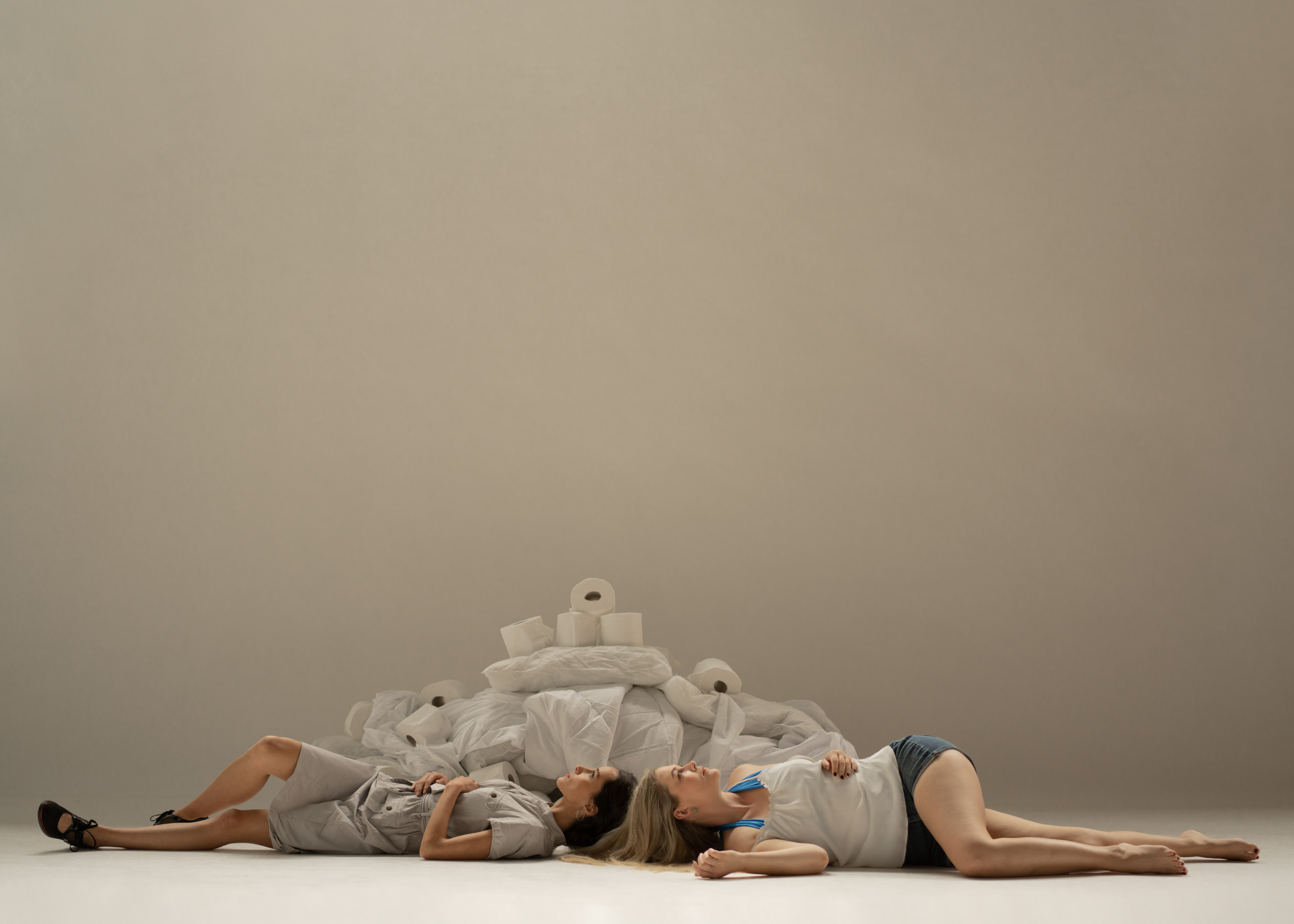
(Enjoy our bilingual review of this bilingual play! English words follow the Spanish below.)
Algo que me fascinó de la obra Clean / Espejos fue el enfoque en el idioma. Me encantó lo completamente bilingüe que era la obra. Es que ser un miembro del público Latine para una obra de teatro Latine en el contexto de Vancouver es: 1. improbable, y 2. cuando pasa, se siente raro, ya que es muy obvio para quién es la obra, y no suele ser para nosotres. Me refiero a un Spanglish á lá “/dios mío/ I didn’t see you there!” — siempre quiero que me guste, pero normalmente me deja sintiéndome un poco triste y cansada. Y hambrienta. Definitivamente hay un paralelo gastronómico aquí, pero ese no es el punto. El punto es que me encantó Clean / Espejos porque no parecía una obra de teatro con una estética Latine o Spanglish — se sintió para mi verdadera y fundamentalmente bilingüe.
Esta obra era para nosotres. Pero este sentimiento de pertenencia se quebró después de la obra en la sesión de preguntas y respuestas, cuando una mujer con esas buenas intenciones tan comunes preguntó si harían una gira por California y Toronto, donde había más comunidades Latines. Miramos a nuestra alrededor. Así de fácil es borrar la Latinidad en Vancouver, ¡pero estamos aquí! ¡Somos muches! Nos encanta cultura ¡Jellouuu!
Ambos personajes en la obra fueron bien construídos y representados. Tanto Adriana como Sarah son entidades culturalmente específicas, desde el lenguaje hasta la forma en que sueñan, desde sus miedos hasta sus mayores defectos. Es lindo (y básico) ver a un personaje Latine construido e interpretado igual de fuertemente que su contraparte anglo. Alexandra Lainfiesta hizo un gran trabajo con el papel de Adriana.
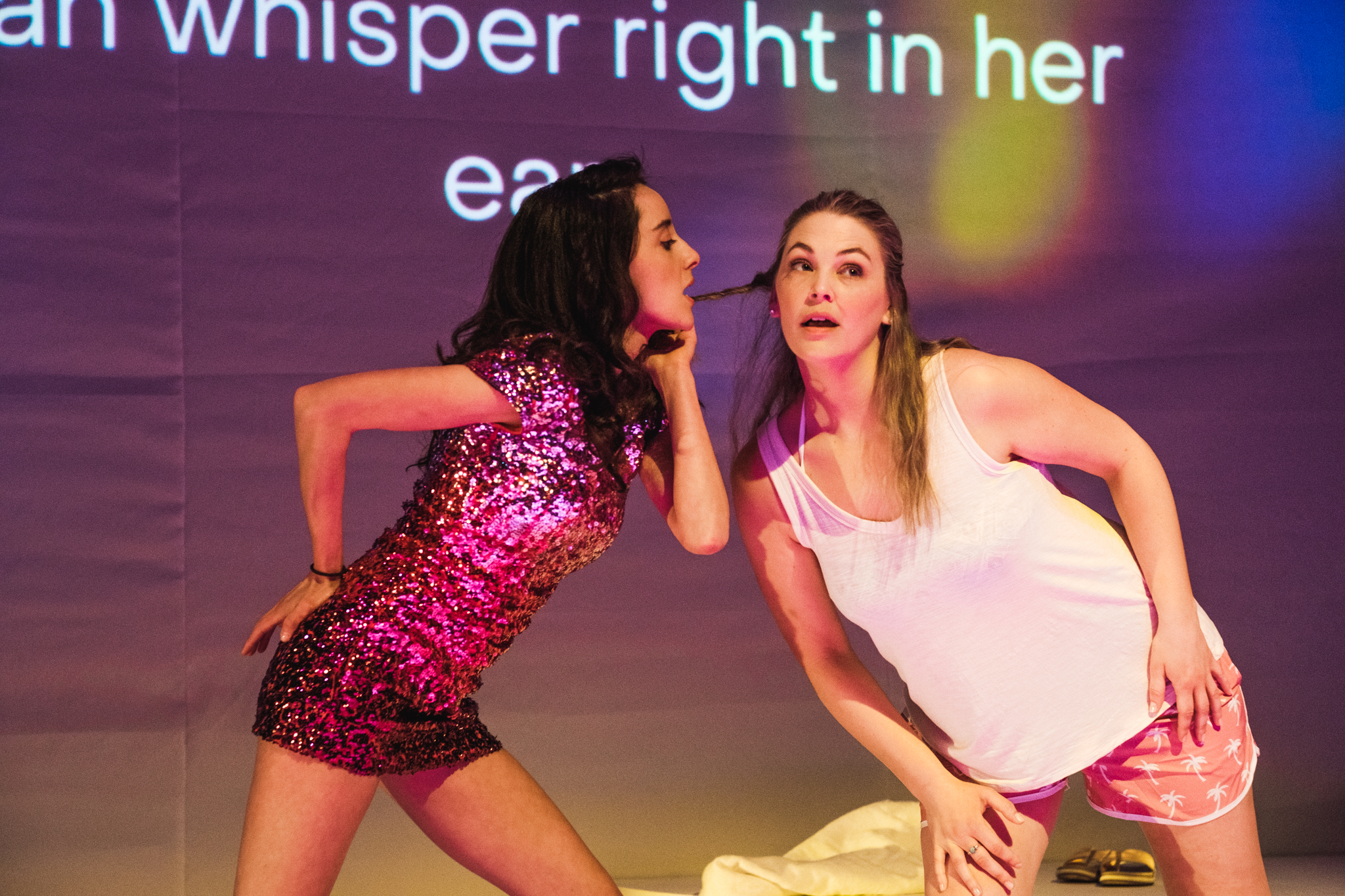
Y después los subtítulos. AMO los subtítulos. Sinceramente, me sentí eufórica al leer esos subtítulos descarados y atrevidos en español mientras Sarah hablaba. Sumaban para hacer sentir que Christine Quintana y Paula Zelaya Cervantes estaban ahí diciendo “sí, esta obra es para ti, carajo!!!” También me recordó a los memes de una manera deliciosa. Porque daba la sensación de que los subtítulos en español no se limitaban a traducir, sino que estaban llenos de subtextos ricos y comentarios sobre los monólogos de Sarah (fantástica interpretación de Genevieve Fleming, por cierto) mientras la trataban con cariño. Como un ser humano real y digna de empatía. Por ejemplo, Sarah, toda cruda y débil una mañana se vuelve extra chistosa con los subtítulos de varios tamaños detrás: “¡Mierda MIERDA MIERDA!” Porque una mala traducción puede ser increíblemente chistosa, y aprecio esa alegría que la obra fomenta en estos momentos. Creo que sería justo llamar a los subtítulos personajes en sí mismos.
Pero la traducción es también un lugar de intermediación en las relaciones de poder. Esto culmina en una escena doble muy tensa de una fiesta en la que Adriana tiene sexo borrachísima junta a la piscina, lo cual Sarah malinterpreta a través del lente de su propio trauma. Estos dos personajes se enfrentan entonces en la única interacción directa que tienen en toda la obra, y la emoción y la mala traducción son simplemente hermosas tanto como incómodas. Esta es la única parte de la obra sin subtítulos y la tensión se siente.

Durante los últimos 45 minutos más o menos, somos testigos de cómo Adriana y Sarah siguen adelante después de esta interacción y con cada uno de sus traumas e historias en general. Honestamente, mi amiga y yo no necesitabamos estos últimos 45 minutos, tanto porque se tardaron mucho como porque daba la sensación de que convertían el final en un “momento de enseñanza,” y ya sabemos para quiénes son éstos. Y siento que no servía a estos dos personajes tan brillantes que crearon. ¿Qué pasaría si dejáramos la historia en el punto de traducción mala de Sarah y, en cambio, Adriana se fuera a algún otro lugar? Y si sus cambios pasaran en nuestras imaginaciones en vez de el escenario? También hay algo sobre el colorismo en México (y Latinoamérica) que faltaba explorar, algo que espero esté al alcance del teatro Latine de Vancouver en algún momento.
He visto a algunos críticos de teatro usar la frase “descubrir el verdadero México” al describir la obra—y pues bueno, mejor reírnos! Esta obra es obviamente subversiva y no un acto de turismo. Y punto, periodt. Lo repito. ¡Sigan adelante, Christine Quintana y equipo, sigan sosteniendo su mirada como propia!
_____________________________________________________________________________________________
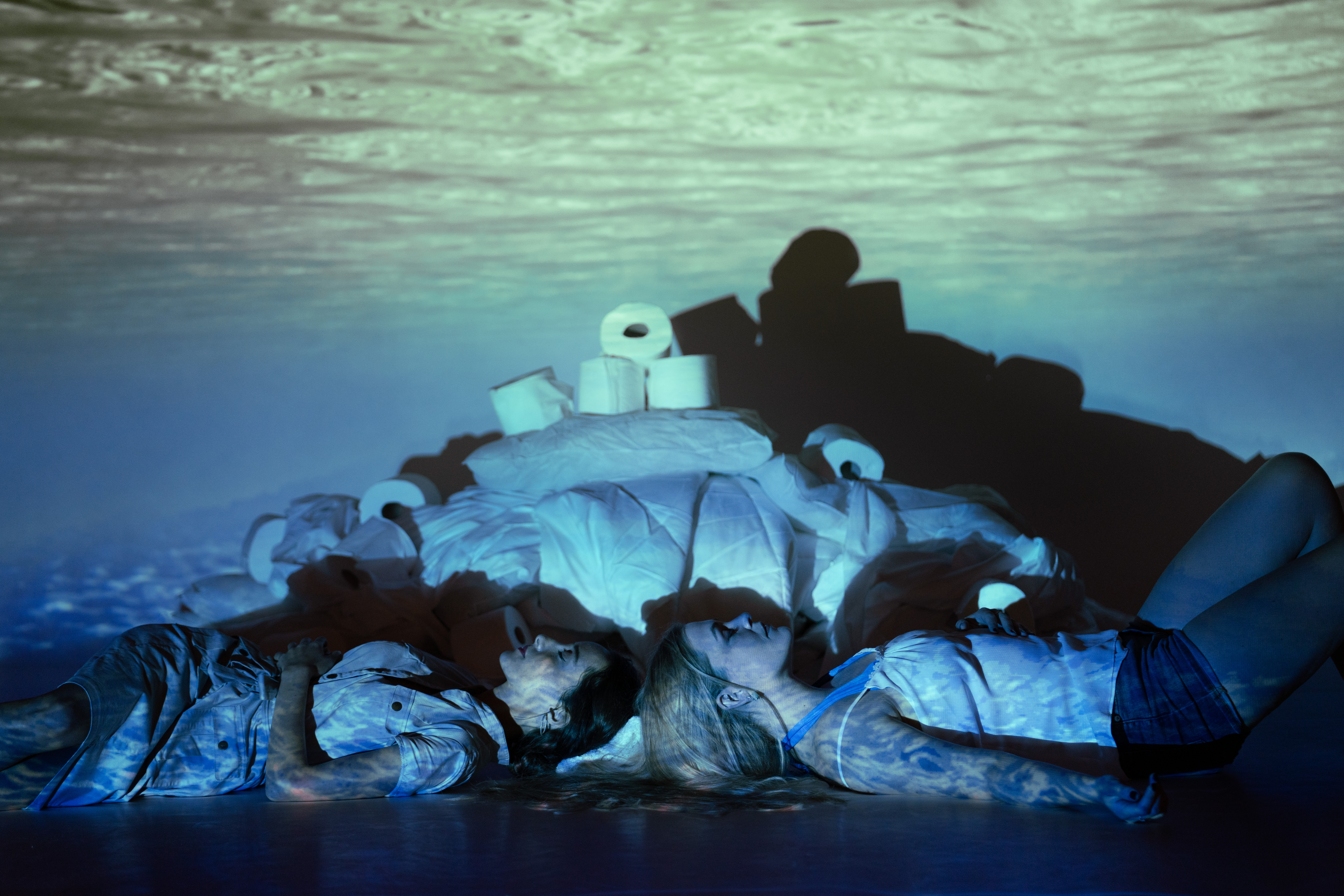
What I loved most about Clean / Espejos was the treatment of language. I was delighted at how fully bilingual the play was. Being a Latinx audience member for a Latinx play in the context of Vancouver is often an alienating experience, because of how glaringly obvious it is who the play is for, and it’s not usually us. Spanglish á lá “/dios mío/ I didn’t see you there!” that I always want to love, but usually leaves me feeling just kinda sad and tired. And hungry. There’s definitely a food parallel here, but I digress. I loved Clean / Espejos because it didn’t feel like a play with a Latinx or Spanglish aesthetic. Instead, it felt truly and fundamentally bilingual and both Adriana and Sarah were culturally specific entities, from language to how they dream, from their fears to what their biggest flaws are. Hotel manager Adriana, performed by Alexandra Lainfiesta, was just as much—if not more—represented and understood as Sarah, the Canadian wedding guest.
But then I was reminded that this feeling of belonging was temporary in the Q&A when a white woman asked earnestly whether they’d tour to California and Toronto where there were more Latino communities. We looked around and it struck me: how easy it is to erase Latinidad in Vancouver — but we’re here! There are a lot of us! We love culture! Hello!
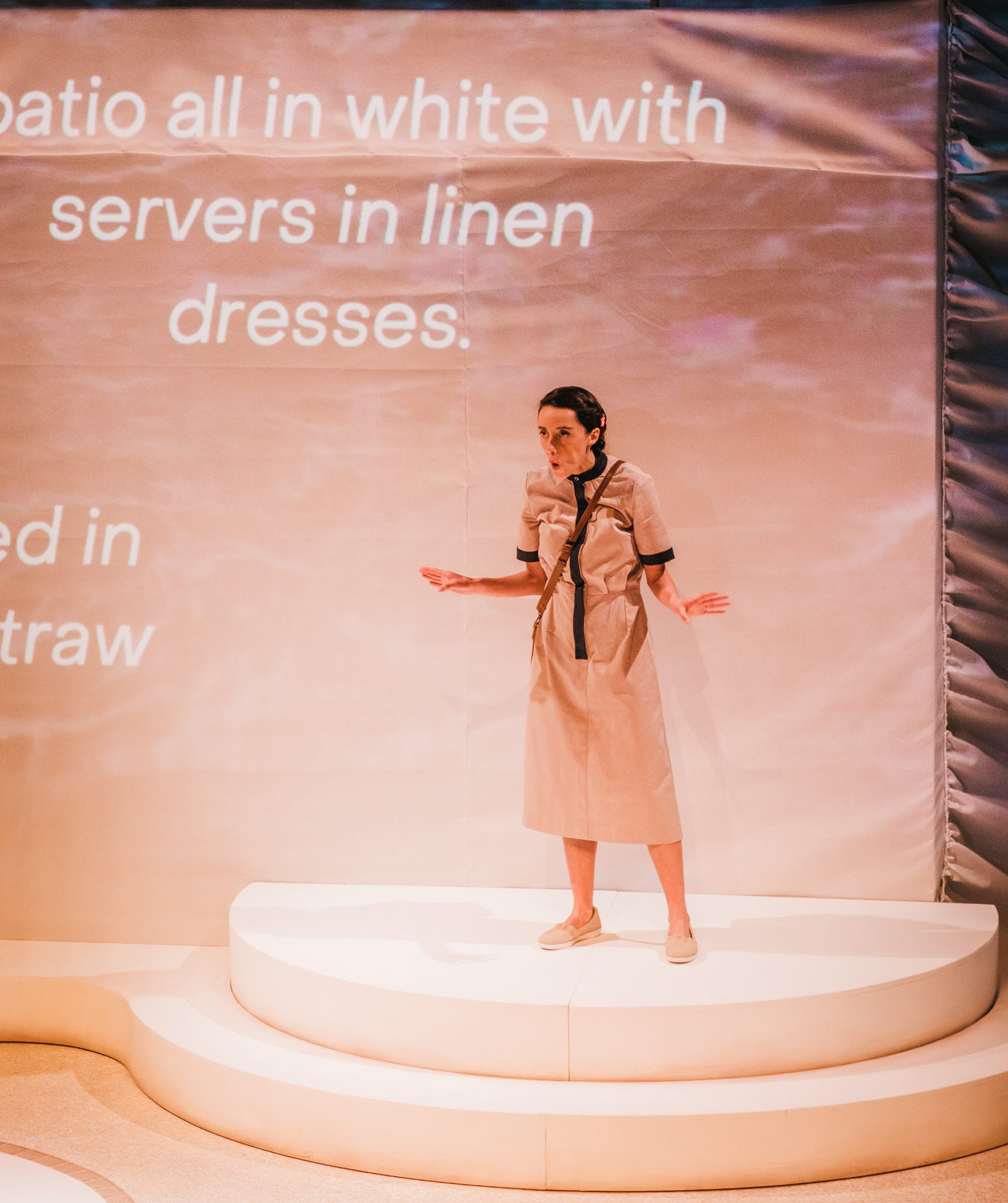
And the subtitles. I honestly felt euphoric when reading the cheeky and sassy Spanish subtitles during Sarah’s segments—these were little clues that added up to make it feel like Christine Quintana and Paula Zelaya Cervantes were there saying “yes, this play is for you, chingadamadre.” It also reminded me of memes in a delightful way. Because it felt like the Spanish subtitles were not just translating, but also full of rich subtext and commentary on Sarah’s monologues (fantastic performance by Genevieve Fleming, by the way) while still treating her like a real human being worthy of empathy. Sarah, hungover and self-pitying becomes extra hilarious with subtitles of varying sizes behind, with “MIERDA MIERDA MIERDA!” Because bad translation can be hilarious, and I really appreciate how joyfully the play lingers on these moments. I think it would be fair to call the subtitles characters themselves. But translation is also a site for brokering power relations. This culminates in a very tense double-scene of a party when Adriana has some cathartic drunk sex by the pool which Sarah misinterprets through the lens of her own trauma. The characters then confront each other in the only direct interaction that they have throughout the whole play, and the tension, emotion, and bad translation are simply sublime. This is the only part of the play without subtitles and the tension is palpable.
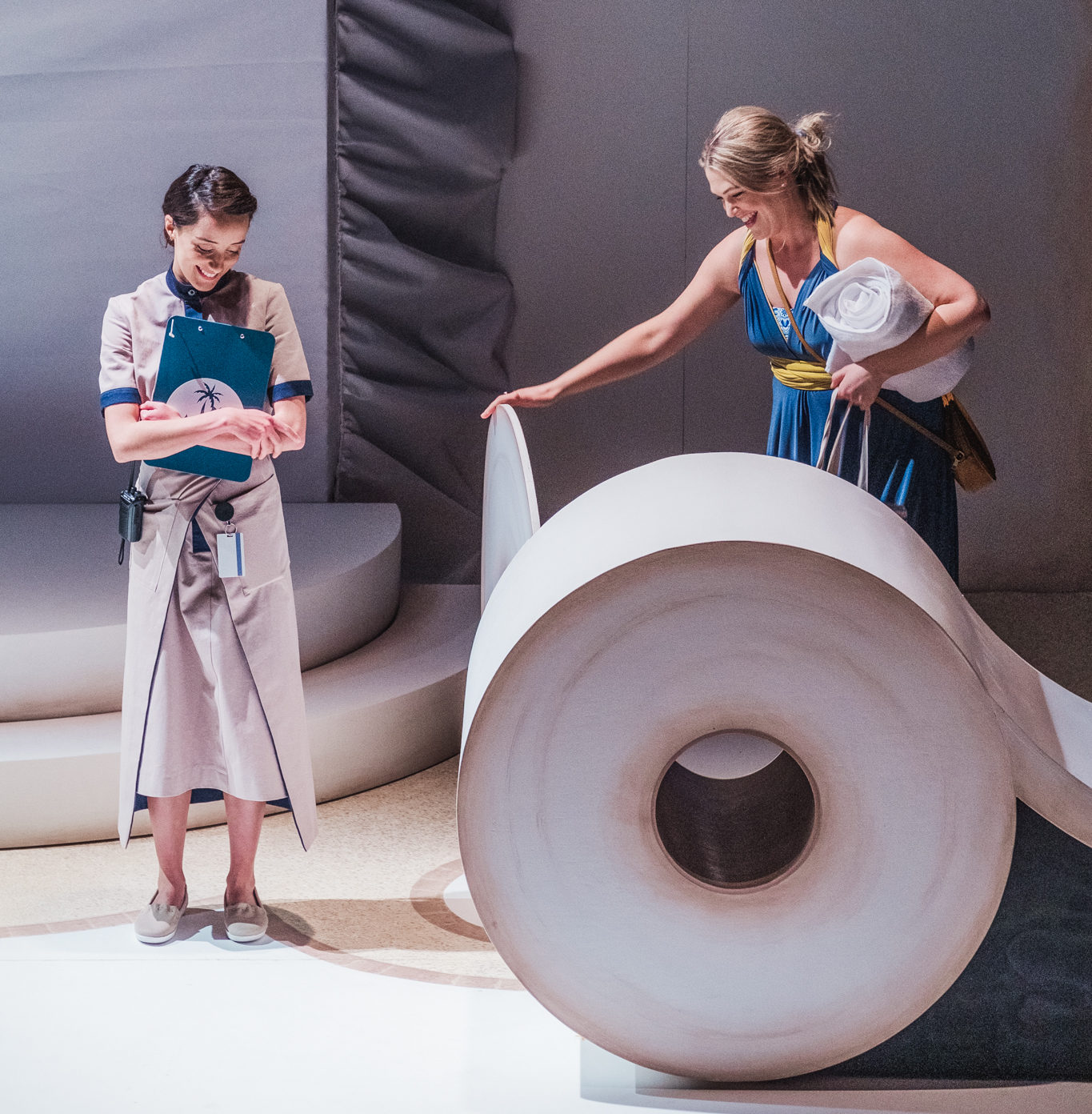
Then, for the last 45 minutes or so, we witness how Adriana and Sarah move on from this interaction and through each of their traumas and stories generally. My friend and I could’ve done without these last 45 minutes, both because it dragged but also because it felt like it turned the ending into a “teachable moment,” and we know who those are for. What would happen if we left off the story at the height of Sarah’s misunderstanding, and instead, Adriana took off somewhere fun? What if their changes happened in our imaginations instead of the stage? There is also something to explore about colorism in Mexico (and Latin America) that felt was missing, something that I hope will be within reach of the Vancouver Latinx theatre at some point.
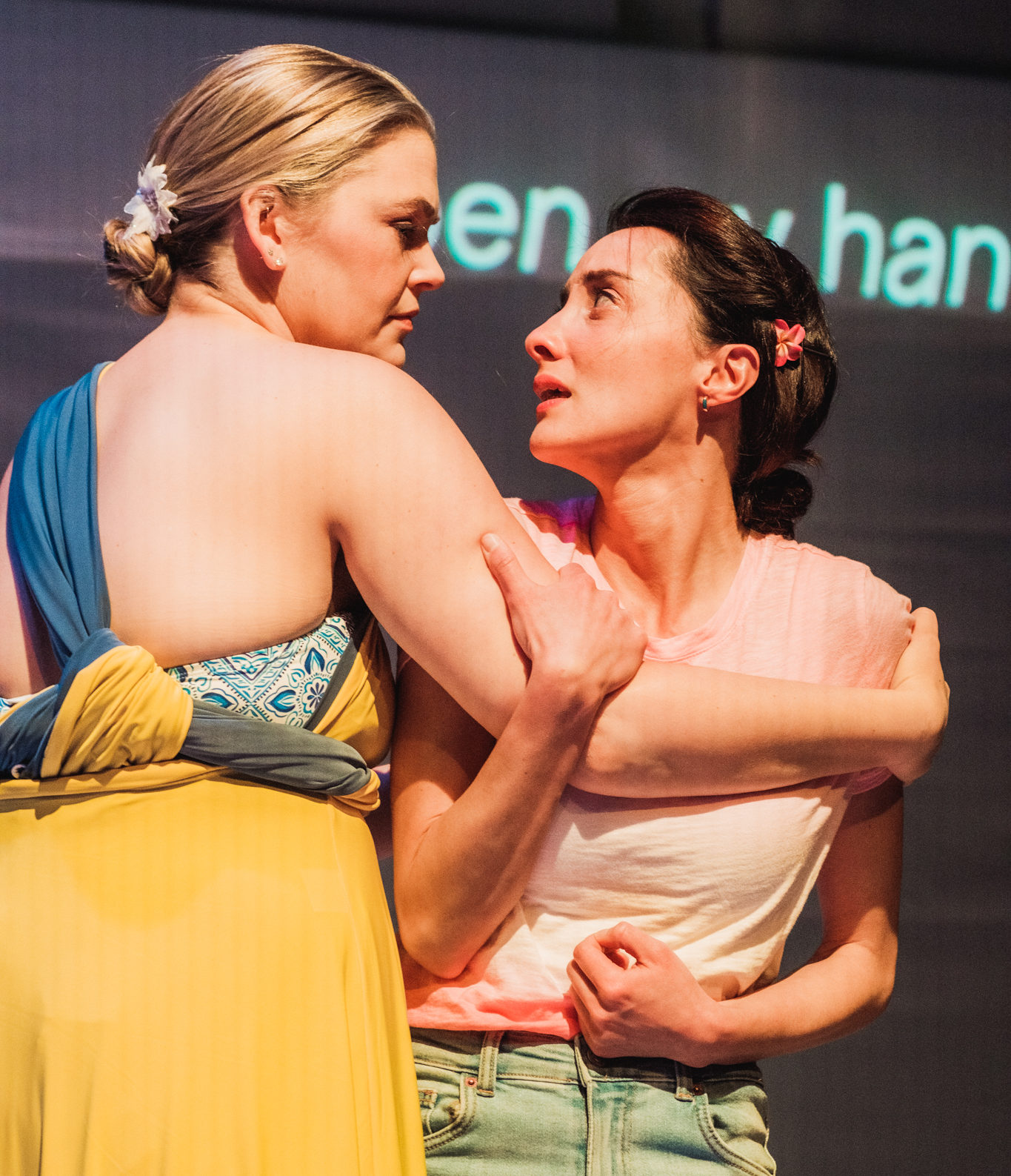
I saw a few regular theatre reviewers use the phrase “discover the real Mexico” in their reviews describing the play—jaja wow, please stop! This work is so obviously subversive and not an act of tourism. Keep going, Christine Quintana and team, keep holding your gaze as your own!
“Clean / Espejos” goes on tour in Kamloops. Get your tickets here! And check out the exciting seasons in full swing at The Cultch and New World Theatre.
– Dora Prieto
